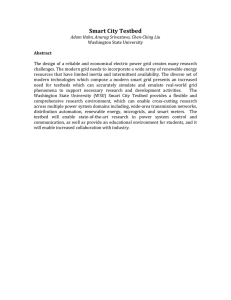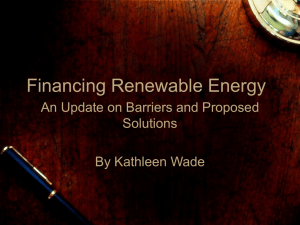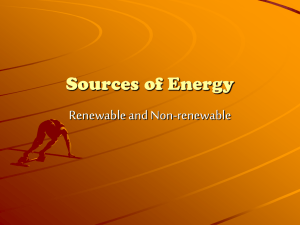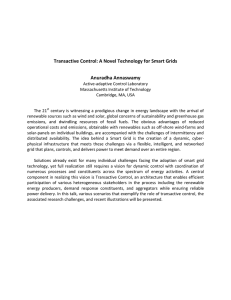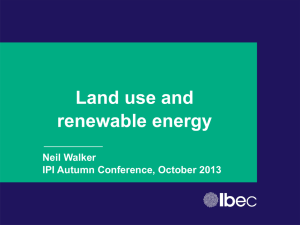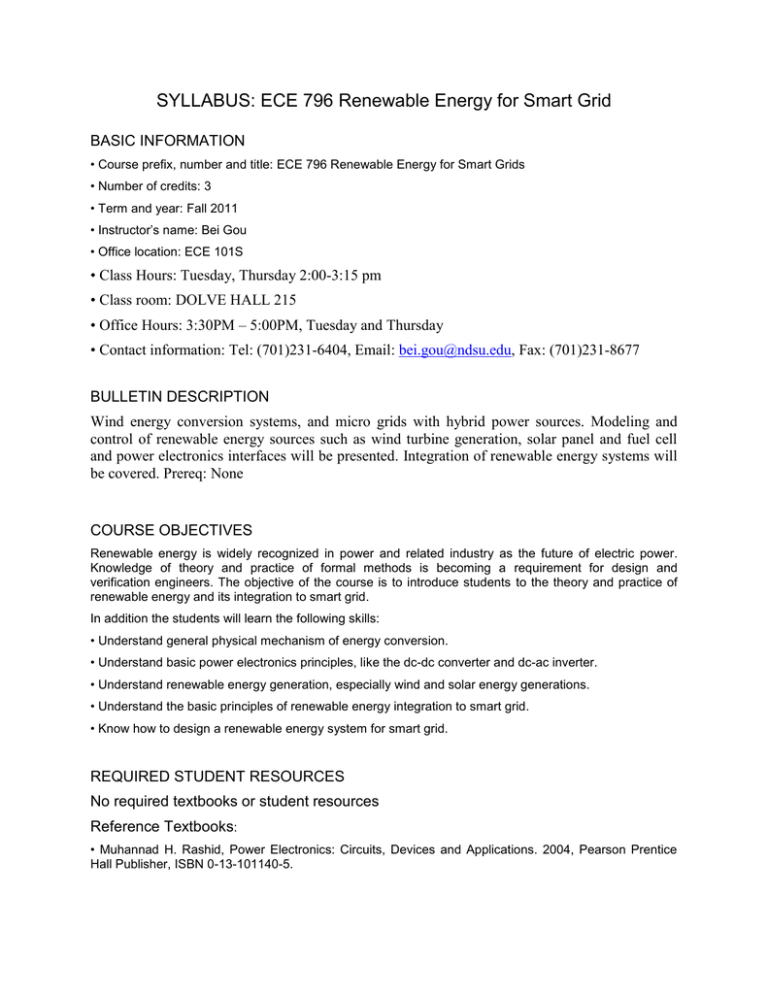
SYLLABUS: ECE 796 Renewable Energy for Smart Grid
BASIC INFORMATION
• Course prefix, number and title: ECE 796 Renewable Energy for Smart Grids
• Number of credits: 3
• Term and year: Fall 2011
• Instructor’s name: Bei Gou
• Office location: ECE 101S
• Class Hours: Tuesday, Thursday 2:00-3:15 pm
• Class room: DOLVE HALL 215
• Office Hours: 3:30PM – 5:00PM, Tuesday and Thursday
• Contact information: Tel: (701)231-6404, Email: bei.gou@ndsu.edu, Fax: (701)231-8677
BULLETIN DESCRIPTION
Wind energy conversion systems, and micro grids with hybrid power sources. Modeling and
control of renewable energy sources such as wind turbine generation, solar panel and fuel cell
and power electronics interfaces will be presented. Integration of renewable energy systems will
be covered. Prereq: None
COURSE OBJECTIVES
Renewable energy is widely recognized in power and related industry as the future of electric power.
Knowledge of theory and practice of formal methods is becoming a requirement for design and
verification engineers. The objective of the course is to introduce students to the theory and practice of
renewable energy and its integration to smart grid.
In addition the students will learn the following skills:
• Understand general physical mechanism of energy conversion.
• Understand basic power electronics principles, like the dc-dc converter and dc-ac inverter.
• Understand renewable energy generation, especially wind and solar energy generations.
• Understand the basic principles of renewable energy integration to smart grid.
• Know how to design a renewable energy system for smart grid.
REQUIRED STUDENT RESOURCES
No required textbooks or student resources
Reference Textbooks:
• Muhannad H. Rashid, Power Electronics: Circuits, Devices and Applications. 2004, Pearson Prentice
Hall Publisher, ISBN 0-13-101140-5.
• Bin Wu, Yongqiang Lang, Navid Zargari, Power Conversion and Control of Wind Energy Systems.
WILEY 2011.
• J. W. Tester, E. M. Drake, M. W. Golay, M. J. Driscoll, and W. A. Peters, Sustainable Energy: Choosing
Among Options. The MIT Press, ISBN 978-0-262-20153-7.
COURSE SCHEDULE/OUTLINE/CALANDAR OF EVENTS
• Week 1: Introduction to energy conversion principle. August 23-August 29
• Week 2: Basic power systems. August 30-Sept 1
• Week 3: Introduction to Smart Grid. Sept 6-Sept 8
• Week 4: Introduction to Renewable Energy. Sept 13-15
• Week 5: Generators of wind energy. Sept 20-22
• Week 6: Generators of solar energy. Sept 27-29 (Lab Demonstration on 9/22)
• Week 7: Control of wind energy generation. Oct 4-6
• Week 8: Mid-term Exam (Oct 11)
• Week 9: Basic electronic semiconductors. Oct 13-18
• Week 10: AC-DC Rectifier and DC-AC inverter. Oct 20-25
• Week 11: DC-DC converter and Induction Machine Control. Oct 27-Nov 1
• Week 12: PM Machine Control and Wind Power Introduction and Control. Nov 3-8
• Week 13: Hybrid and Electric Vehicle Application. Nov 10
• Week 14: Integration of renewable energy to smart grid. Nov 15-17
• Week 15: Integration of renewable energy to smart grid. Nov 22-24
• Week 16: Problems of renewable energy to smart grid. Nov 29-Dec 1
• Week 17: Project presentation and submission. Dec 6-8. Deadline: Dec 8
EVALUATION PROCEDURES AND GRADING CRITERIA
Project: A research project is due at the end of the semester. Talk to the instructor about project topics.
The project involves 5 stages: (1) Summary of the state of the art (2) problem formulation (3) approach to
solve problem (4) implementation and evaluation of solution, and (5) project presentation and final report.
The project deliverables including models, code, and final report should be submitted before the project
deadline. No late submissions will be accepted. Students will be evaluated based on the importance and
relevance of problem, solution quality, progress of implementation and evaluation, and clarity of final
report and presentation.
Project Presentations: One of the course objectives is to ensure that students learn how to solve an
existing problem, how to develop and design a renewable energy system or how to integrate renewable
energy generators into smart grid. Students will be required to prepare and present their results in class
for problems assigned by the instructor. Evaluation will be based on soundness of presented design and
the test results.
Grading:
Mid-term Exam: 20%
Homework: 10% x 2 = 20%
Project Presentations: 10%
Project results and reports: 50%
Final Scores
Letter Grades
90%~100%
A
75%~89%
B
60%~74%
C
45%~59%
D
0%~44%
F
ATTENDANCE STATEMENT
“According to NDSU Policy 333, attendance in classes is expected.” Even though attendance will not be
marked, unannounced quizzes may be given in class. All tests/student presentations will be announced in
class prior to the date administered. Only an excused absence will allow the student to make up an hour
test. See your instructor before the test if possible. Any discrepancies or errors in grading must be
brought to the instructor’s attention within a day after handing back the test; otherwise no adjustment will
be made.
AMERICAN DISABILITIES ACT FOR STUDENTSWITH SPECIAL NEEDS
STATEMENT
Any students with disabilities or other special needs, who need special accommodations in this course
are invited to share these concerns or requests with the instructor as soon as possible.
APPROVED ACADEMIC HONESTY STATEMENT
All work in this course must be completed in a manner consistent with NDSU University Senate Policy,
Section 335: Code of Academic Responsibility and Conduct http://www.ndsu.nodak.edu/policy/335.htm
and the CEA Honor System available at http://www.ndsu.nodak.edu/ndsu/cea/
SYLLABI ON WEBPAGES
The date of last updated Syllabi will be presented on my web page.
Veterans and student soldiers with special circumstances or who are activated are encouraged to notify
the instructor in advance.

